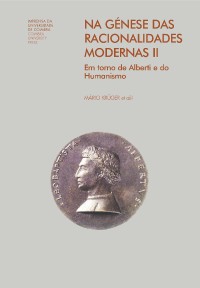Please use this identifier to cite or link to this item:
https://hdl.handle.net/10316.2/36681| DC Field | Value | Language |
|---|---|---|
| dc.contributor.author | Moniz, Gonçalo Canto | |
| dc.contributor.author | Mota, Nelson | |
| dc.date.accessioned | 2015-06-11T11:09:16Z | |
| dc.date.accessioned | 2020-09-09T10:27:14Z | - |
| dc.date.available | 2015-06-11T11:09:16Z | |
| dc.date.available | 2020-09-09T10:27:14Z | - |
| dc.date.issued | 2015 | - |
| dc.identifier.isbn | 978-989-26-1014-6 | |
| dc.identifier.isbn | 978-989-26-1015-3 (PDF) | |
| dc.identifier.uri | https://hdl.handle.net/10316.2/36681 | - |
| dc.description.abstract | In the late 1940s, Leon Battista Alberti’s work and thinking were reconceptualised by a new generation of architects and historians that aimed at reconciling Man and modern architecture. Indeed, this generation triggered an architectural debate that pursued a more humanistic approach to architecture, supported by a new paradigm, modern humanism. The first part of this article aims at identifying the background against which this new approach came about, through a critical review of a key work, the book Architectural Principles in the Age of Humanism, published in 1949 by the art historian Rudolf Wittkower (1901‑1971). Then, the article discusses the extent to which the idea of modern humanism influenced the international architectural debate in the 1950s on architectural education and design, especially in post‑‑war CIAM and in the outset of Team 10. Finally the article examines the impact of this debate in Porto’s School of Fine Arts, through the performance of its young teachers, both in their educational approach as well as in their professional practice. The article concludes that there is a bridge between Alberti’s humanism and the construction of a new way of architectural thinking, teaching and designing at the School of Porto, which was chiefly built up by Fernando Távora and Octávio Lixa Filgueiras through their interpretations of the idea of modern humanism. | eng |
| dc.description.abstract | No final da década de 1940, a obra e o pensamento de Leon Battista Alberti são revisitados por uma nova geração de arquitetos e historiadores que pretendem repensar a arquitetura moderna a partir da sua relação com o Homem. Esta geração envolve‑se num debate sobre a arquitetura onde se exploram outros caminhos na procura de uma abordagem disciplinar mais humanista, suportada por um novo paradigma, o humanismo moderno. Num primeiro momento, este artigo pretende identificar a origem desta nova abordagem, nomeadamente a partir de uma leitura crítica a uma obra chave, o livro Architectural Principles in the Age of Humanism, publicado em 1949 pelo historiador de arte Rudolf Wittkower (1901‑1971). Num segundo momento, interessa analisar o impacto que o humanismo moderno teve nos debates internacionais sobre arquitetura na década de 1950, concretamente nos CIAM e na fundação do grupo que viria a ser conhecido como TEAM 10, tanto na construção de um ensino humanista como de uma arquitetura humanista. Num terceiro momento, verifica‑se que este debate teve também desdobramentos na Escola Superior de Belas Artes do Porto, através da ação dos seus jovens docentes, tanto na prática pedagógica, como na prática profissional. Deste modo, pode‑se estabelecer uma ponte entre o humanismo albertiano e a construção de uma forma de pensar, de ensinar e de fazer arquitetura na Escola do Porto, que foi fundamentalmente protagonizada por Fernando Távora e Octávio Lixa Filgueiras. | por |
| dc.language.iso | por | - |
| dc.publisher | Imprensa da Universidade de Coimbra | por |
| dc.relation.ispartof | http://hdl.handle.net/10316.2/36661 | por |
| dc.rights | open access | - |
| dc.subject | Architecture | eng |
| dc.subject | Humanism | eng |
| dc.subject | Alberti | eng |
| dc.subject | CIAM | eng |
| dc.subject | School of Porto | eng |
| dc.subject | Architecture | fre |
| dc.subject | Humanisme | fre |
| dc.subject | Alberti | fre |
| dc.subject | CIAM | fre |
| dc.subject | École de Porto | fre |
| dc.subject | Arquitetura | por |
| dc.subject | Alberti | por |
| dc.subject | Humanismo | por |
| dc.subject | CIAM | por |
| dc.subject | Escola do Porto | por |
| dc.title | De Alberti aos CIAM: em Direção a uma Abordagem humanista do ensino da Arquitetura e do habitat | por |
| dc.type | bookPart | por |
| uc.publication.firstPage | 371 | - |
| uc.publication.lastPage | 388 | - |
| uc.publication.location | Coimbra | por |
| dc.identifier.doi | 10.14195/978-989-26-1015-3_19 | - |
| uc.publication.section | VI. Ética, decoro & ornamenta | por |
| uc.publication.digCollection | PB | por |
| uc.publication.orderno | 20 | - |
| uc.publication.area | Artes e Humanidades | por |
| uc.publication.bookTitle | Na génese das racionalidades modernas II: em torno de Alberti e do Humanismo | - |
| uc.publication.manifest | https://dl.uc.pt/json/iiif/10316.2/36681/208559/manifest?manifest=/json/iiif/10316.2/36681/208559/manifest | - |
| uc.publication.thumbnail | https://dl.uc.pt/retrieve/11140281 | - |
| uc.publication.parentItemId | 54508 | - |
| uc.itemId | 69744 | - |
| item.grantfulltext | open | - |
| item.fulltext | With Fulltext | - |
| Appears in Collections: | Na génese das racionalidades modernas II: em torno de Alberti e do Humanismo | |
Files in This Item:
| File | Description | Size | Format | |
|---|---|---|---|---|
| de_alberti_aos_ciam.pdf | 2.62 MB | Adobe PDF |  |
Items in DSpace are protected by copyright, with all rights reserved, unless otherwise indicated.
